Education
Harvard’s president says the school will ‘not compromise’ on its rights with the Trump admin
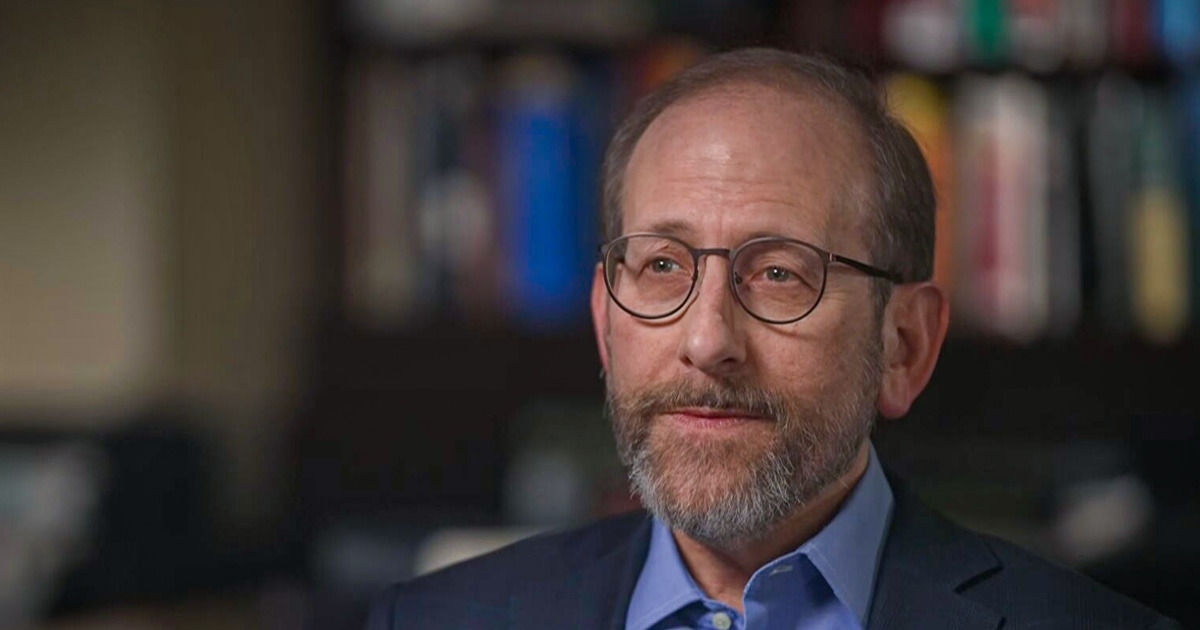
The head of Harvard University doubled down on his defiance against the Trump administration on Wednesday, saying the Ivy League school would not compromise on certain issues despite the federal government’s threat to freeze more than $2 billion in funding.
In an exclusive interview with NBC News’ Lester Holt, Harvard President Alan Garber said the school had “no choice” but to fight back against what it believes is federal overreach and an illegal attempt by the government to withhold funding as leverage to control academic decision-making.
Watch “NBC Nightly News with Lester Holt” for the full interview tonight at 6:30 p.m. ET/5:30 p.m. CT.
“We are defending what I believe is one of the most important lynchpins of the American economy and way of life — our universities,” Garber said.
In a letter on April 11, the Trump administration outlined a list of “critical reforms” it wanted Harvard to make to keep $2.2 billion in grants. The reforms included allowing the government to audit who the school hires and admits for at least the next three years.
When Harvard rejected the demands, the administration said it would freeze the funding, citing the school’s unwillingness to seriously address antisemitism and the harassment of Jewish students.
Harvard then sued the federal government on Monday to halt the funding freeze.
Speaking about the issue for the first time on Wednesday, Garber said the lawsuit was necessary to protect the school’s independence and constitutional rights, as well as the future of higher education in the United States.
“We will not compromise on certain issues,” said Garber, the head of Harvard since 2024. “We’ve made that very clear.”
Garber, who is Jewish, admitted that the Massachusetts campus has a “real problem” with antisemitism amid a war between Israel and Hamas that began after the terrorist group attacked Israel in October 2023.
In its lawsuit, Harvard outlined steps it has taken to curb incidents of antisemitism, including imposing “meaningful discipline” for policy violators, beefing up security, enhancing programs meant to address bias and hiring staff to support those programs.
Garber said the antisemitism issue has nothing to do with the research that the federal grants fund.
The research that is now at risk includes efforts to improve the prospects of children who survive cancer, to understand at the molecular level how cancer spreads throughout the body, to predict the spread of infectious disease outbreaks, and to ease the pain of soldiers wounded on the battlefield, he said.
“Putting that research at jeopardy because of claims of antisemitism seems to us to be misguided,” Garber said. “The effort to address antisemitism will not be advanced by shutting off funding.”
He added that nearly all federal funding is directed toward the research the government has deemed high-priority.
Even if there is a short pause in funding, Garber said there are long-lasting consequences to the research. In some cases, he said it would be impossible to pick the projects back up.
“There is so much at stake,” he said. “People leave their jobs. We have patients whose treatment in clinical trials might be interrupted. Animals that are used in research sometimes cannot continue to be maintained when the funding stops.”
Garber said he is “very concerned about Harvard’s future” and the partnership between the federal government and research universities that he said has improved lives and has made the U.S. a “technological powerhouse.”
“That partnership has been responsible over the decades for dramatic innovation in science and technology,” he said.
The White House did not immediately respond to a request for comment.
In a statement announcing the freeze on April 14, the government said Harvard was reinforcing the “troubling entitlement mindset that is endemic in our nation’s most prestigious universities and colleges — that federal investment does not come with the responsibility to uphold civil rights laws.”
“The disruption of learning that has plagued campuses in recent years is unacceptable. The harassment of Jewish students is intolerable,” the statement added. “It is time for elite universities to take the problem seriously and commit to meaningful change if they wish to continue receiving taxpayer support.”
In a Truth Social post a day later, President Donald Trump took it a step further and suggested Harvard should lose its tax-exempt status.
Harvard’s defiance has been widely applauded on campus and beyond.
In recent weeks, the Trump administration has paused billions of dollars in federal grants to other prestigious universities, including Columbia and Princeton. More than 150 university and college presidents co-signed a letter Tuesday condemning the Trump administration’s efforts to get the institutions to change their admissions processes and penalize student protesters.
Garber said Harvard was prepared for a long battle with the Trump administration.
When asked whether it was a fight he could win, Garber said he did not know the answer.
But, he said, “the stakes are so high that we have no choice.”
Education
Columbia University students plan to build tent encampments this week, sources say
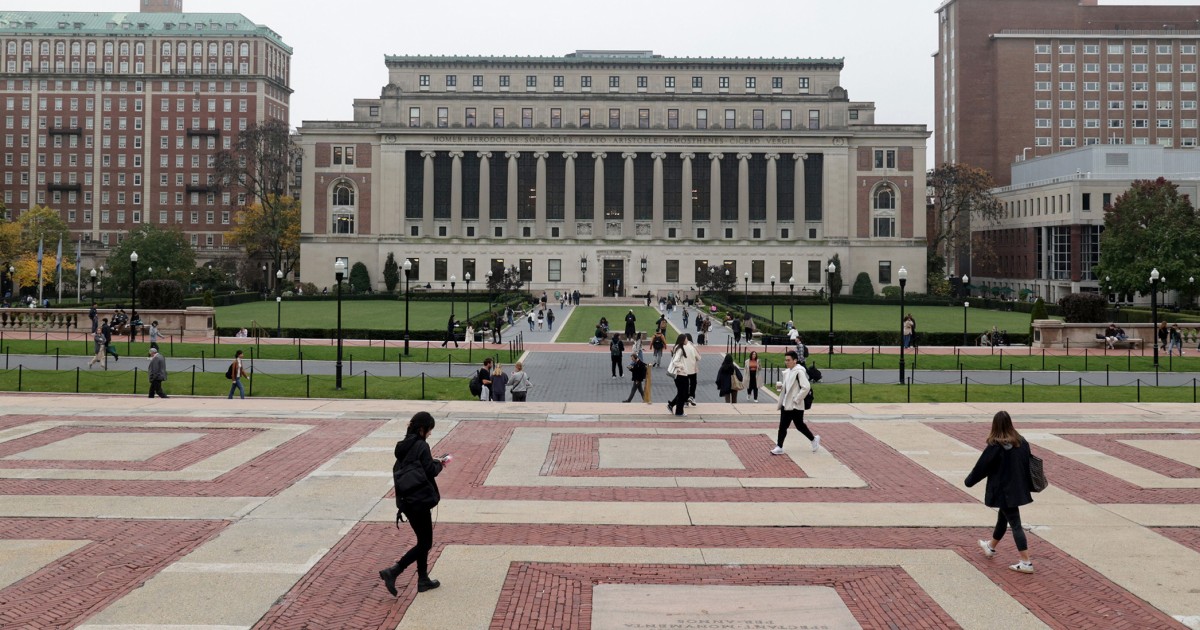
A group of protesters is planning to set up tent encampments on Columbia University campuses this week in protest of the war in Gaza, according to three people familiar with the planning and a recording of a meeting to plan the action shared with NBC News.
The planned encampments come just over a year after students first erected about 50 tents on a university lawn to protest the war and drew the world’s attention.
Those demonstrations, in part, fueled the Trump administration’s effort to extract concessions from Columbia, saying the university failed to quell antisemitism on its campus.
Planning for the encampments has been shrouded in secrecy.
The coordinating meeting took place at a community center on Tuesday night in Brooklyn’s Bushwick neighborhood, approximately 12 miles from campus, according to screenshots of Signal messages from organizers and a person who was at the meeting.
Invitations for the meeting were largely distributed in person or verbally over the phone, according to the person who attended the meeting and asked not to be named due to fears of discipline from the school.
More than 100 people were present at the gathering and all wore masks to conceal their identities, according to the person. It is unclear if all of the participants were Columbia students, the person said.
The student organizers did not introduce speakers by name and instead used Signal usernames and code names — including the beloved Pokémon “Squirtle” and words such as “butterfly” — to distinguish one another, according to the recording.
Organizers have also refrained from referring to the upcoming encampments as “encampments,” according to screenshots of Signal messages from the organizers and conversations with two people familiar with the planning for the protests. In writing, and verbally, participants have designated the encampments with a code name, the “circus.”
Organizers asked demonstrators not to arrive on campus wearing masks on the days of the protests, which they said could alert campus security officers, according to the recording.
“This year feels so much more organized and careful,” the person who was at the meeting said.
Columbia did not immediately return a request for comment.
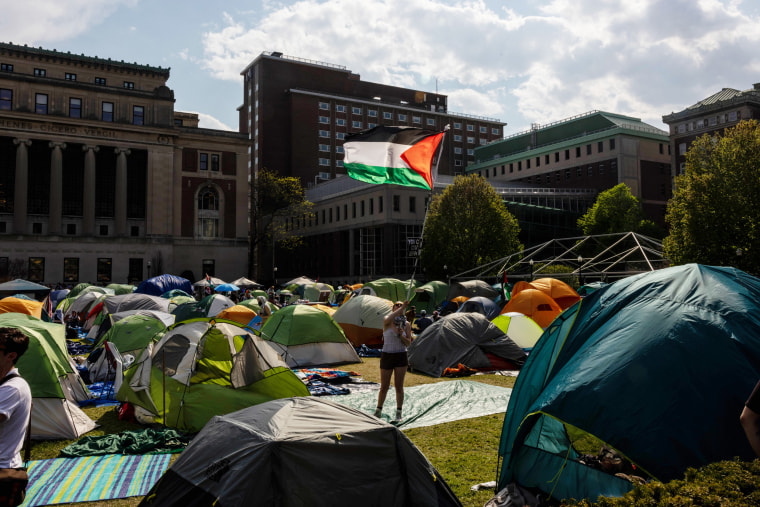
Students are planning to erect an encampment on Thursday at the university’s main campus in Manhattan’s Morningside Heights neighborhood and a second encampment on Friday at the university’s nearby Manhattanville campus, according to the recording.
“When we take over the lawn, our goal is to unify the space and make it our own,” one of the organizers said, according to the recording.
Thursday’s encampment was planned to start at 1 p.m. on the West Butler Lawn of the university’s main campus, where encampments were set up last year, according to the recording, and disperse before nightfall or before police enter the campus.
There will be a second encampment that is expected to be more robust and begin the next day. It is unclear when the Friday encampment will begin, but according to the recording, students plan to stay indefinitely and expect arrests to be made.
Organizers chose to stage Friday’s encampment at the Manhattanville campus — the site of the university’s business school — because it is not gated off to outsiders, unlike the main campus, according to a person who attended the meeting.
A speaker at the meeting also said that the site of the second encampment was aimed at protesting the university’s gentrification of Harlem, according to the recording.
“Any action that we do will bring police, will bring repression and we thought about that deeply and we’re aware of that,” a speaker at the meeting said to applause. “And we’re stuck in this situation where inaction is also violence.”
Organizers of the upcoming protests have distributed several guidelines, obtained by NBC News, to student protesters. These guidelines cover legal risks associated with protesting, best practices for encounters with law enforcement and strategies for securing their digital presence.
The document on digital security advises that students communicate only through encrypted messaging services such as Signal, over the phone, or in person. It also suggests that students turn off Wi-Fi on their phones while protesting to avoid being traced by the university.
Another form shared by the organizers and obtained by NBC News asks students to provide “all the information necessary to support your legal defense” for their emergency contacts in the event of arrest.
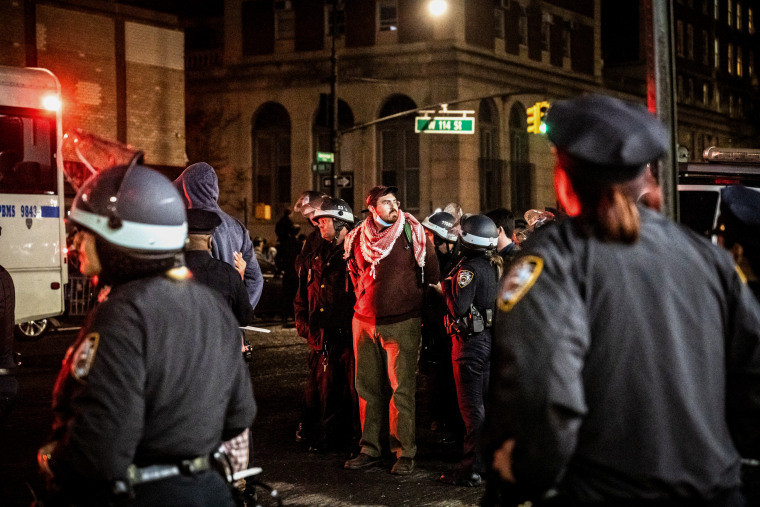
It asks for student protesters to list any medical conditions, insurance information, prescriptions, if they have dependents, where their government IDs are, their address and how emergency contacts can access their apartments or homes.
“Given the Trump Administration’s commitment to pursuing federal action against pro-Palestine protestors and the abduction of our comrade Mahmoud Khalil, we are now asking students to prepare not only for potential arrest and jail for several hours or overnight, but for the possibility of prolonged jail time,” the form reads. “Give serious thought to the question of how you would prepare for weeks or months in jail.”
The upcoming encampments precede a monthslong campaign of protests at the university last year, which inspired similar demonstrations at college campuses across the country and around the world. Dozens of students who participated in the encampments were arrested by local authorities or expelled from the university.
The protests were prompted by the Israeli military’s response to the Oct. 7, 2023, Hamas terrorist attacks, in which more than 1,200 people were killed and about 250 were taken hostage, according to Israel. More than 51,000 people have been killed in Gaza and millions have been displaced in the war that followed, according to health officials in Gaza.
Student activists staged the demonstrations last year in an attempt to get their universities to divest from companies linked to the Israeli government.
The encampments also come amid the Trump administration’s push to intervene in Columbia’s affairs and some of the nation’s oldest higher education institutions. The federal government canceled the university’s federal grants on March 7, part of what the Trump administration says is a broader effort to “root out” antisemitism on college campuses.
In an effort to restore the grants, which fund dozens of universities’ top-tier research expeditions, Columbia agreed to a list of the administration’s demands on March 21.
The demands included instituting a mask ban at protests in most cases; hiring an outsider to oversee its department of Middle East, South Asian and African studies; committing to “greater institutional neutrality”; and enlisting three dozen new security officers with newly installed powers to arrest students.
Faced with its own deal by the Trump administration, Harvard University rejected the administration’s demands and sued the administration several days later, aiming to restore billions in funding.
The protests also come several weeks after federal immigration officials apprehended at least three Columbia students who participated in the student-led protests, including 30-year-old Mahmoud Khalil.
Education
DEI rollbacks hit campus support systems for students of color
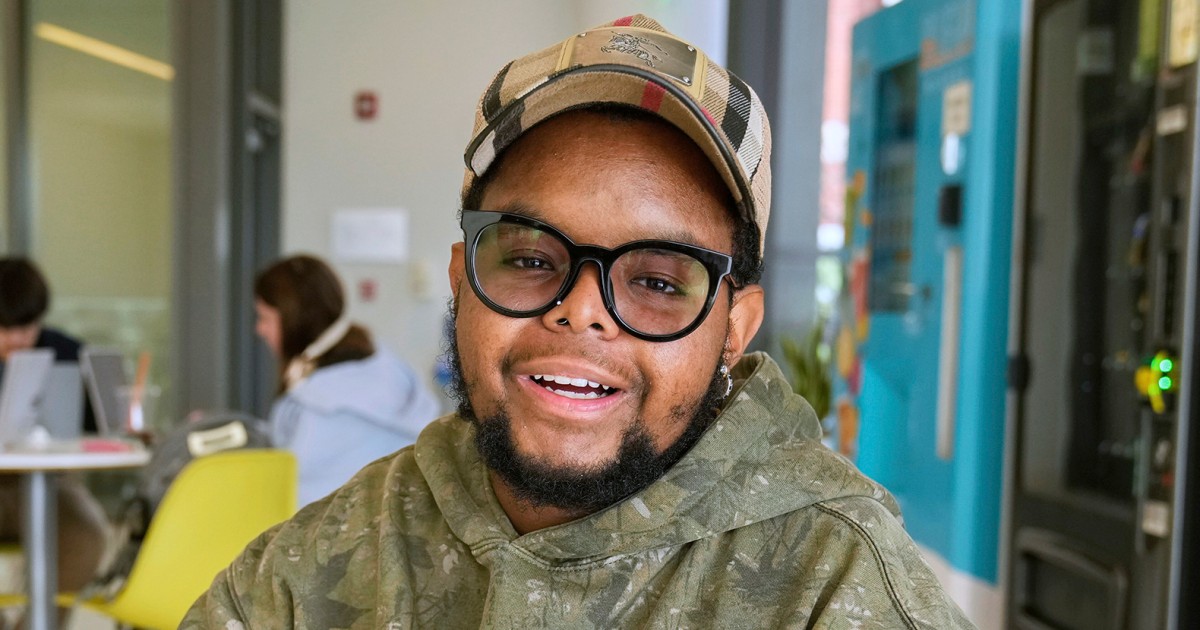
Campus mentors. Move-in events. Scholarships. Diversity offices that made them feel welcome on predominantly white campuses.
As U.S. colleges pull back on diversity, equity and inclusion practices, students of color say they are starting to lose all of these things and more.
The full scope of campus DEI rollbacks is still emerging as colleges respond to the Trump administration’s orders against diversity practices. But students at some schools said early cuts are chipping away at the sense of community that helped open the door to higher education.
“It feels like we’re going back. I don’t know how else to describe it,” said Breeana-Iris Rosario, a junior at the University of Michigan, which is closing its DEI office and scrapping a campus-wide inclusion plan. “It’s like our voices aren’t being heard.”
The retreat from DEI has been building for years, driven by Republican-led states that have ordered public colleges to close DEI offices and eliminate programs. But it has accelerated under President Donald Trump and his threats to cut federal funding.
Trump’s administration escalated the battle when it suggested in a letter to Harvard University that the school should lose its nonprofit status for defying federal orders, including a demand to eliminate DEI “to the satisfaction of the federal government.”
At Michigan, students have been told the casualties include the LEAD Scholars program, a financial aid award for Black, Latino and Native American students, along with orientation events for new Latino, Arab and Asian American students. The university said Tuesday it has not decided whether to eliminate or restructure the orientation programs.
Coming from a low-income part of Detroit, Rosario said winning the LEAD scholarship cemented her decision to attend Michigan. She later met some of her best friends at a move-in event for Latino students called Alma. Losing those programs, she fears, could reinforce a sense of isolation among Hispanic students, who make up 6% of the school’s undergraduates.
“It would be hard to find my community if I didn’t have access to these resources,” she said.
Colleges respond to federal orders
A February memo from the Education Department directed schools and colleges to eliminate race from any decision-making around hiring, admissions, housing, financial aid and student life. It warned violators could lose access to federal money.
Dozens of universities have since come under investigation, all while the Trump administration freezes billions of dollars at Harvard and other colleges accused of defying orders on campus antisemitism and transgender athletes.
Michigan was among the first to make major DEI rollbacks, and others have followed to avoid federal scrutiny. Others have rebranded DEI offices and scrubbed the term from websites, and others still are standing firm in support of DEI.
At Case Western Reserve University in Cleveland, officials cited the federal orders when they moved to close the campus DEI office last month.
“It is clear we must be in compliance with them to receive the federal funding that is critical to our present and future,” said Eric Kaler, Case’s president, in a campus message.
Kaler said the office will be replaced by an Office for Campus Enrichment and Engagement, though it’s unclear what that will entail. The private university receives about $250 million a year in federal research funding, 16% of its total revenue, according to university data.
Justen Pippens said the DEI office was like a second home on campus. The junior called it a “stress-free zone” where he could get personal and academic guidance. He grew so close with one staff member that he came to know her as Auntie. He said it’s unclear whether those employees will have jobs at the new office.
Case also is halting its Envision Weekend, an orientation event for underrepresented students. Pippens said it’s a setback for him and other Black students, who make up just 6% of undergraduates at Case.
“Now,” he said, “we no longer have our central support systems on campus.”
A victory for DEI opponents
In Virginia, Republican Gov. Glenn Youngkin celebrated when the University of Virginia’s governing board voted to end DEI programs in March.
“DEI is done at the University of Virginia,” Youngkin said in a statement, calling it a shift toward “merit-based opportunity.”
Tyler English, a senior at UVA, said students have been told scholarships and graduate programs focused on minority students are being scaled back or eliminated. Among other changes, a student group called Men of Color, Honor and Ambition is replacing the word “color” with “character,” he said.
“For a portion of us, we now question whether our identities and voices are truly valued in this space,” said English, a member of the campus’ Black Student Alliance.
University spokesperson Brian Coy wouldn’t provide details on DEI rollbacks and said he couldn’t confirm changes to scholarships.
The government’s anti-DEI campaign is being challenged in court by opponents who say it offers little clarity on exactly which practices are outlawed, leaving schools to weed out anything that could be construed as DEI.
As a result of the vague directives, “those who are advocating against this work are getting a higher return on their investment than they should,” said Paulette Granberry Russell, president of the National Association of Diversity Officers in Higher Education.
Yet opponents are pressing the White House to go further. Christopher Rufo, a conservative strategist who has fought DEI, said the government should root out DEI using tools that forced desegregation during the Civil Rights Movement.
“DEI is a violation of the Civil Rights Act,” Rufo said on X. “Any publicly funded institution that continues to practice DEI should face a federal investigation, consent decree, termination of funds, and loss of nonprofit status. If that doesn’t work, send in the 101st Airborne.”
Some fear diversity setbacks
In Michigan, the rollbacks are targeting programs that aimed to preserve racial diversity after the state banned affirmative action in 2006, including the LEAD program.
University of Michigan officials declined to discuss changes, but a campus message from President Santa Ono said the school will find other ways to support students, including an expansion of scholarships for low-income students.
Rosario and other LEAD scholarship winners received an email saying there would be “no adverse financial impact” to their financial aid, with no further explanation.
Rosario doesn’t entirely blame the university for the cuts, but she wonders why Michigan moved quickly to make changes while some colleges held firm. The first in her family to attend college, she fears what it means for the next generation of students.
“They’ve taken away our sense of community,” she said. “It just makes it that much harder for people of color to feel comfortable pursuing higher education.”
Education
Over 150 college presidents sign letter rebuking ‘government overreach’
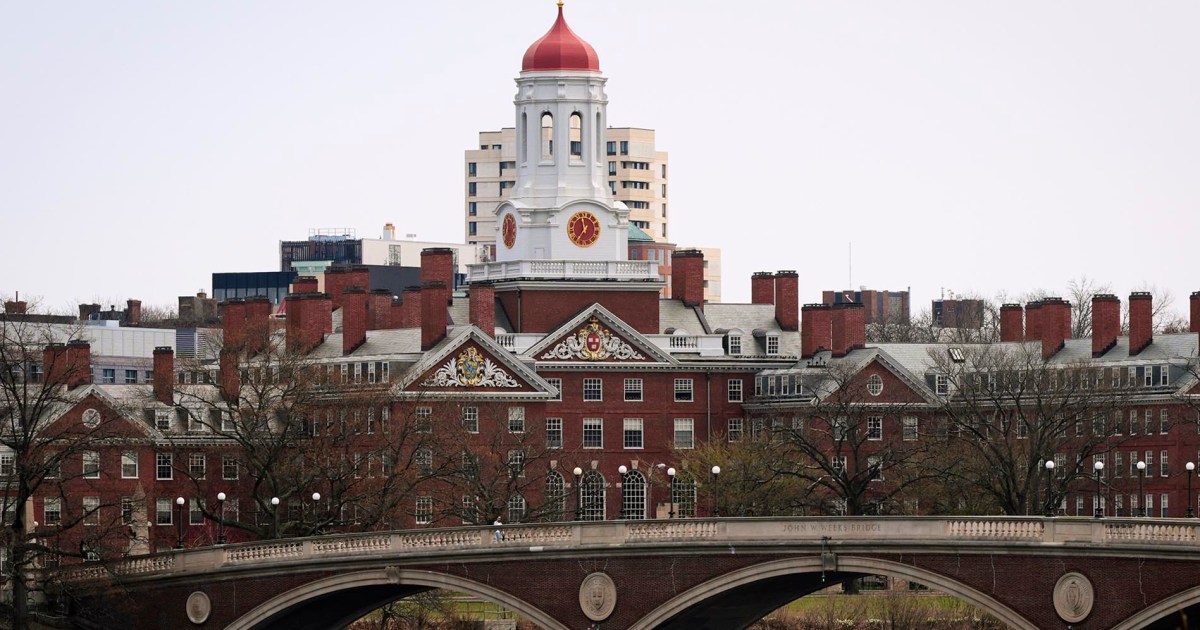
More than 150 university and college presidents co-signed a letter on Tuesday condemning the Trump administration’s recent efforts to dictate the policies of private higher education institutions in exchange for federal funding.
In recent weeks, the Trump administration has paused billions of dollars in federal grants to several of the nation’s most prestigious universities — including Harvard, Columbia and Princeton — in an attempt to get the universities to change their admissions processes and penalize student protestors.
The letter’s signatories range from large public universities to small liberal arts schools, and include each of the Ivy League schools, except for Columbia University and Dartmouth University.
“As leaders of America’s colleges, universities, and scholarly societies, we speak with one voice against the unprecedented government overreach and political interference now endangering American higher education,” the Tuesday letter, orchestrated by the American Association of Colleges and Universities, says.
“We are open to constructive reform and do not oppose legitimate government oversight,” the letter continues. “However, we must oppose undue government intrusion in the lives of those who learn, live, and work on our campuses.”
“We will always seek effective and fair financial practices, but we must reject the coercive use of public research funding,” it adds.
The White House did not immediately return a request for comment.
So far, the Trump administration has only paused or threatened to pause billions of dollars of federal funding, which is vital to the operations of several universities, including Columbia, Harvard, the University of Pennsylvania, and Princeton. The moves are part of the administration’s broader effort to “root out” antisemitism on college campuses.
Columbia ceded to a list of demands by the Trump administration last month in exchange for starting talks to restore funding. The demands included instituting a mask ban at protests in most cases, hiring an outsider to oversee its Department of Middle East, South Asian, and African studies, committing to “greater institutional neutrality” and enlisting three dozen new security officers.
The New York City-based university’s acquiescence prompted outrage among the higher education community. Columbia’s interim president at the time, Katrina A. Armstrong, resigned a week later.
Harvard was similarly sent a list of demands by the Trump administration, which mandated that the university audit the viewpoints of students and professors and shutter its diversity, equity, and inclusion programs.
Although it initially appeared that the university would take a similar approach to Columbia, Harvard ultimately rejected the administration’s orders.
Harvard, which was founded more than a century before the United States, sued the administration on Monday and asked a federal judge in Massachusetts to reverse the termination of $2.2 billion in federal grants to the university.
Tuesday’s letter also denounced the Trump administration’s unprecedented effort to deport international students.
In recent weeks, the Trump administration has revoked hundreds of student visas from foreign students, many of whom are Middle Eastern. Immigration authorities have also apprehended foreign students, some of whom were involved in pro-Palestinian protests at universities last year.
-

 Europe2 days ago
Europe2 days agoSimone Biles, Mondo Duplantis win big at 25th Laureus World Sports Awards
-

 Sports2 days ago
Sports2 days agoShannon Sharpe: Pro Football Hall of Famer and podcast star sued for sexual assault and battery
-

 Sports2 days ago
Sports2 days agoSharon Lokedi smashes women’s course record at the Boston Marathon, John Korir wins men’s race
-

 Conflict Zones2 days ago
Conflict Zones2 days agoGaza’s Christians mourn death of Pope Francis | Israel-Palestine conflict News
-

 Middle East2 days ago
Middle East2 days agoIsraeli spy chief accuses Netanyahu of demanding illegal operations | Politics News
-

 Africa2 days ago
Africa2 days agoKenyan runners win both male and female races at Boston Marathon 2025
-

 Sports2 days ago
Sports2 days agoMavs GM Nico Harrison admits he was surprised by Luka Dončić’s level of popularity with fans following shock trade to Lakers
-
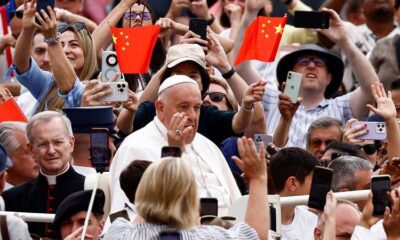
 Asia2 days ago
Asia2 days agoIn China, which has a tense relationship with the Vatican, Pope’s death receives muted official response




